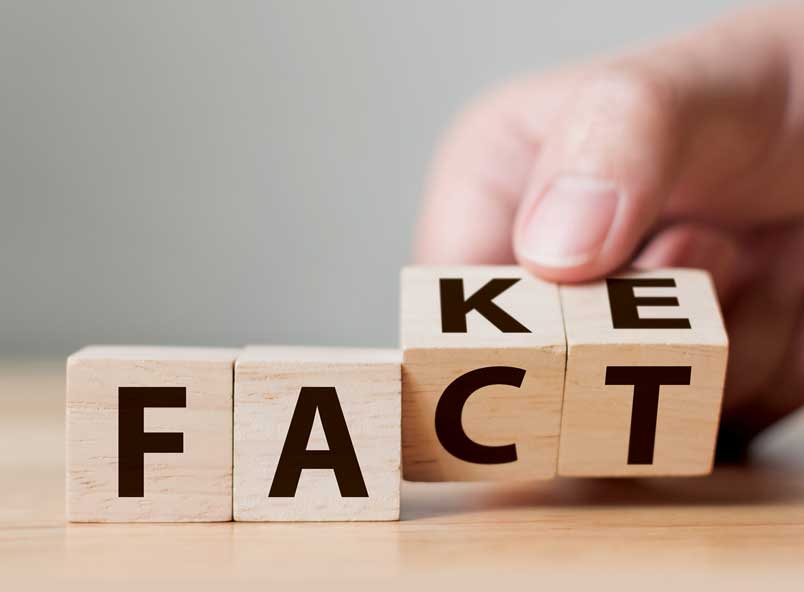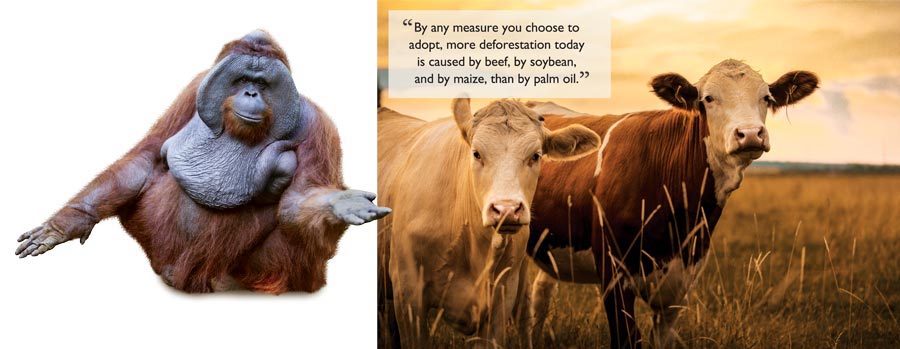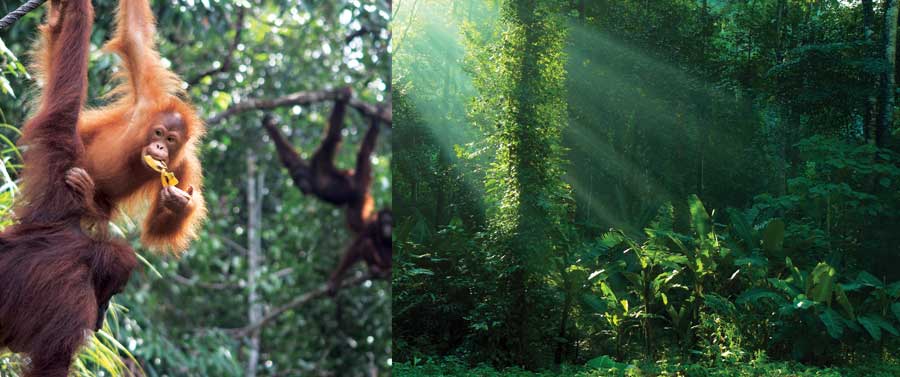



... in seeking to end deforestation
December, 2018 in Issue 4 - 2018, Cover Story
A controversial Greenpeace film about the ‘plight’ of the orang utan in Indonesia and Malaysia completely ignores the reality on the ground and is actually counter-productive.
I HATE to have to say this but James Corden and Bill Bailey have allowed themselves to be duped by an unholy combination of NGOs and naïve retailers.
I’m referring, of course, to the controversy over a recent film made by Greenpeace to highlight the continuing plight of the orang utan in Indonesia and Malaysia, if land is cleared for new oil palm development.
It’s now getting a huge amount of airtime, as Greenpeace offered the use of the film to British supermarket chain Iceland for its Christmas advert.
Greenpeace has a strong relationship with Iceland, the only UK retailer which has committed to phasing out the use of palm oil in all its own products by the end of the year, on the grounds that its CEO Richard Walker doesn’t know how to tell the difference between certified sustainable palm oil and uncertified palm oil.
(By the way, it’s not difficult, Richard. You just have to pay slightly more for the certified oil than for the uncertified oil – but then your customers wouldn’t like that, would they? And it would be really good if you made sure that the 500 tonnes a month you need were certified as sustainable, not least because a lot of certified oil doesn’t find a buyer at the moment, and is sold as uncertified oil!)
When they checked the film, the regulator of broadcast advertising intervened to stop Iceland from using the film on the grounds that it was “too political”.
And that’s because it was made by Greenpeace for specifically “political” reasons, with no requirement on it whatsoever to worry about being “fair, decent, honest and true”.
This has prompted a massive social media campaign, supported by Corden, Bailey and dozens of equally ill-advised celebs calling for the Rang-tan to be “liberated” from this wicked attempt to curtail freedom of speech.
To be honest, that’s a laugh. The film is unashamedly propagandistic and emotional – as John Sauven, CEO of Greenpeace UK, has explicitly acknowledged.
It focuses on a young girl discovering a baby orang utan in her bedroom after it had been driven out of his forest home. They both have huge, dark brown eyes. It’s well-made, and effective – but deeply manipulative. Why?
Four big, fat, completely mendacious implications. Greenpeace does a lot of good work on palm oil issues in all sorts of different ways, but the story of sustainable palm oil is a complicated one, and it is not helped by willful misrepresentations of this kind.
Bizarrely, Greenpeace knows this as well as anyone. Earlier in November, Greenpeace UK released a video which explicitly acknowledges that boycotting palm oil is the wrong thing to do; that switching from palm oil to other oils can be the wrong thing to do, since palm oil is so much more productive per hectare; and that “growing palm oil without deforestation is possible, and there are growers working that way”.
It then turns up the heat in its campaign against Asia’s leading agribusiness group Wilmar, but does so within the kind of proper contextual background that is so seriously absent in the Rang-tan film. Will the real Greenpeace stand up, please?

More than a million people have signed up to the Rang-tan campaign since then. But it would be so good if we could help deepen their awareness here, bearing in mind that:
At which point, I have to make a declaration of personal and professional interest.
In the first place, Forum for the Future does a lot of work with the oil palm industry, for which we are paid.
Our most important project is based in Indonesia where we’re working with five large palm oil companies as well as a wide range of NGOs and international organisations to address complex labour rights challenges within the sector.
But this is also personal. I act as the independent sustainability adviser on behalf of Forum for the Future to Sime Darby Plantation – the largest producer of certified palm oil in the world.
I’ve watched Sime Darby Plantation in particular, together with other big players in the industry, incrementally get its house in order, in order to be able to sell genuinely sustainable palm oil in Europe and elsewhere, as certified by the RSPO.
None of these companies is perfect. Indeed, I remain a fierce critic of just how long it has taken to sort out some of the legacy issues. There are still far too many laggards in the industry, and a lot of environmental damage is still being done.

But to go on vilifying and demonising such a critically important industry, which continues to move forward on challenges like deforestation and better working conditions, makes no sense whatsoever.
The process of certification through the RSPO is indeed not perfect but it’s the best way we have of sorting out the good stuff from the not-good-enough stuff – even if people like Richard Walker don’t understand that basic reality.
So don’t give in to emotion here. Stick to the facts, difficult and messy as they inevitably are.
Just as you should support the good guys in the oil palm industry, and criticise the bad guys, so you should support Greenpeace in the good work it does, but criticise it when it gets it wrong.
This write up published on 22 November 2018 by Sir Jonathon Porritt* in his blog (www.jonathonporritt.com) was in response to a campaign against the alleged refusal of the broadcasting authority to allow a Christmas TV advert by UK retailer Iceland, from being aired on mainstream channels.
The advert, originally produced as an animated short story by Greenpeace UK and narrated by celebrity, Emma Thompson, tells the story of an orang utan ‘forced from her forest home to make way for palm oil production’. Two other UK celebrities James Corden and Bill Bailey also joined the campaign to lift the alleged TV ban.
*Sir Jonathon Porritt is the Co-Founder of Forum for the Future, UK’s leading sustainable development charity, with over 100 partner organisations including some of the world’s leading companies. He is an eminent writer, broadcaster and commentator on sustainable development, as well as the Independent Sustainability Advisor to Sime Darby Plantation Berhad, the world’s no. 1 producer of certified sustainable palm oil.